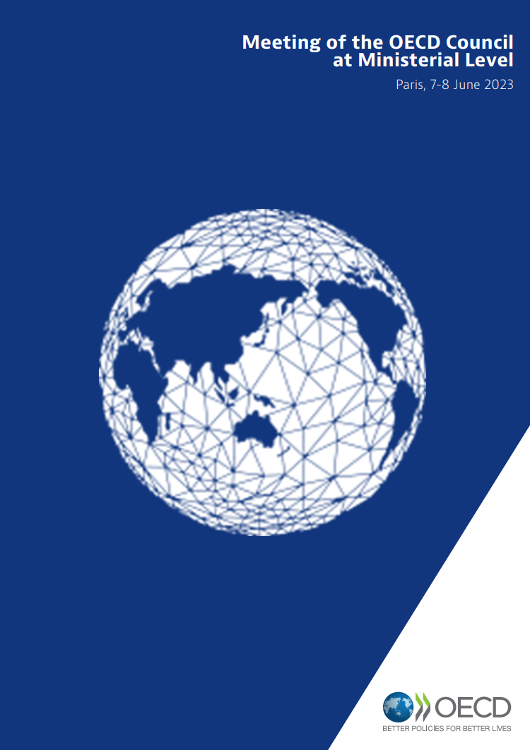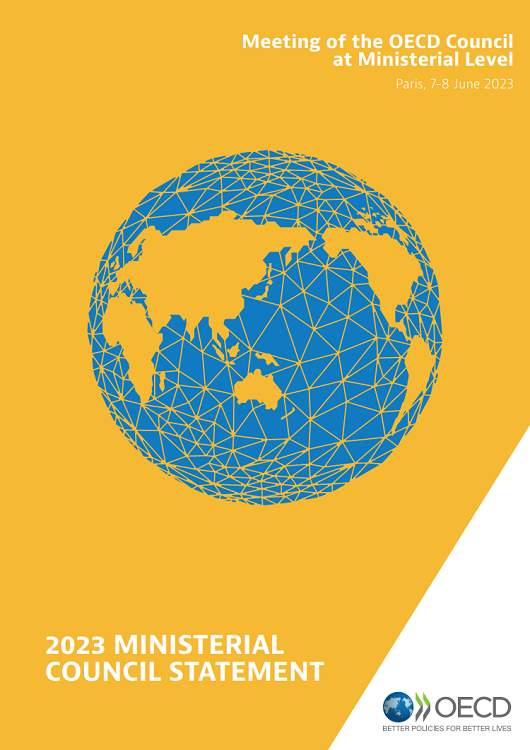Remarks by Mathias Cormann
OECD Secretary-General
Paris, France, 9 June 2022
Welcome to the OECD’s Ministerial Council Meeting on The Future We Want: Better Policies for the Next Generation and a Sustainable Transition.
Thank you Prime Minister Mario Draghi for chairing our meeting.
A warm welcome also to our Vice-Chairs – Norway’s Minister of Foreign Affairs, Anniken Huitfeldt and Mexico’s Minister of Finance, Rogelio Ramírez de la O.
Thank you also to the President of Ukraine, Volodymyr Zelenskyy and the President of Senegal and of the African Union Macky Sall, for joining us this morning.
We are meeting at a challenging moment in our shared history.
Over three months have passed since Russia began its unprovoked, unjustifiable and illegal war of aggression against Ukraine.
A war which has caused and continues to cause great pain and suffering in Ukraine and is imposing a heavy price on the world on the back of lower growth and higher inflation.
Vladimir Putin should stop this senseless, atrocious, unprovoked war now.
The OECD is eager to join in with others, in supporting the recovery and reconstruction plans of the democratically elected government of Ukraine.
We stand ready to deploy all of our unique capabilities as part of a well-coordinated and sustained programme.
We have established an OECD-Ukraine Liaison Office, initially from Paris, but to be based in Kyiv as soon as possible.
Its purpose is to further strengthen and deepen our engagement with Ukraine in support of its recovery and reconstruction effort.
As we said in our latest OECD Economic Outlook released just yesterday, as a result of the war, countries worldwide are being hit by lower growth and higher inflation, curbing real incomes and spending, fuelled in particular by higher commodity prices.
This at a time when the world was still recovering from the pandemic and we continue to face a number of long-standing and increasingly pressing structural challenges.
As we continue to respond to short term pressures, which are real, we must nevertheless remain focused on our structural reform missions - securing the green transition to global net zero, optimising the digital transformation, securing well-functioning global markets, responding to the challenges posed by population ageing and rebuilding fiscal buffers and resilience.
Many vulnerabilities, risks and structural challenges remain.
Many of them can only be solved through effective global cooperation.
The OECD has the capacity and expertise to play a central part in helping to find effective global solutions to the evolving challenges of our time.
Like the historic global agreement we helped broker to make our international tax arrangements fairer and work better in an increasingly digitalised and globalised world economy.
Or, in the future, through our proposal for an Inclusive Forum on Carbon Mitigation Approaches, which we have submitted for your consideration, with the objective of helping to facilitate a globally more coherent better coordinated approach to climate action.
Over the past twelve months we have also taken a deeper and more strategic approach to our partnerships, through our new Global Relations Strategy and Council’s decision in January to open accession discussions with six OECD candidate countries.
Looking ahead, we will continue to contribute solutions to shared global challenges.
First, on optimising the strength and the quality of the ongoing recovery from COVID-19 while responding to the economic and social impacts of the war in Ukraine.
We continue to work with governments and stakeholders to address the economic, social and health challenges caused by the pandemic.
To promote health system resilience.
To identify the necessary lessons to prepare for future challenges, from pandemic preparedness and response, to investments in our health workforce and in digital health.
We will work with you to rebuild a labour market that offers more sustainable, rewarding and good quality job opportunities for all, advancing the mandate received from OECD Employment and Labour Ministers two days ago.
We will take action to help deliver intergenerational equity, fairness and opportunities for all, from the youngest members of our society to the oldest.
We will continue to support Members’ efforts to achieve gender equality, through our analysis and policy advice, and by stepping up the collection and analysis of gender-disaggregated data.
We will strive to help promote social cohesion and solidarity, including through our work on restoring and reinforcing trust.
Second, we will continue our work to provide leadership on climate action to help secure global net zero by 2050 in a way that is effective and fair.
We need to turn commitments to net-zero emissions into tangible outcomes in a cost-effective, economically responsible and publicly-supported way that does not leave people behind, especially those in jobs, sectors and places where the transition may be felt hardest.
The major new initiative being discussed by Ministers tomorrow for an Inclusive Forum on Carbon Mitigation Approaches will help facilitate an evidence-based multilateral exchange of information about the different policy approaches around the world to reach net zero emissions.
We stand ready to help our Members and Partners do more.
More to reduce emissions, to increase climate resilience, to mobilise climate finance, to halt and reverse biodiversity loss, to fight pollution, to use natural resources more sustainably, to phase out environmentally harmful subsidies and to eliminate harmful plastic waste.
Third, we will advance our work on seizing all the many benefits and opportunities of the digital transformation while better managing some of the associated risks, challenges and disruptions.
There is a need for a broad reflection on models of digital and technology governance to ensure they are fit-for-purpose.
The challenge is to collectively construct practices and policies that can shape the trajectory of this transformation to support and advance value-based and human-centric standards.
Over the next year, we also need to implement the global agreement on the two-pillar solution to address the tax challenges arising from digitalisation.
Fourth, helping to ensure well-functioning global markets and a global level playing field with a rules-based trading system in good working order.
The sustainable expansion of global trade and investment is one of the most important drivers of further economic development and better international economic relations.
We need to push back against the forces of economic nationalism and protectionism while making sure that the benefits of trade are widely and fairly shared.
We need to promote policy settings that facilitate, encourage and incentivise the post-COVID recovery and investment.
We have just completed the OECD’s first comprehensive strategic review of trade.
This will allow us to address the most pressing threats to the rules-based international trading system and adapt to future shocks and global challenges.
We must also leverage our existing standards, such as the OECD Guidelines for Multinational Enterprises and the OECD Due Diligence Guidance for Responsible Business Conduct, to help build more resilient and sustainable global value chains.
Fifth, we will continue to broaden our global engagement.
There is no doubt that OECD membership remains the most direct and effective way for us to disseminate our shared values, principles and standards.
Following the Council’s historic decision earlier this year to open accession discussions, we are moving forward with the accession process for Brazil, Bulgaria, Croatia, Peru and Romania.
We remain in positive discussions with Argentina on next steps in the accession process for them.
Tomorrow Ministers will be invited to adopt the individual Accession Roadmaps, along with the Accession Core Principles endorsed by our various Committees, which we will use to assess each candidate country’s alignment with the OECD’s shared values, standards and good practices.
Beyond accession, we are strengthening our co-operation with Southeast Asia, and taking steps to establish a reinforced partnership with Africa based on openness, inclusiveness, trust and mutual learning.
To President Sall and to all our distinguished African delegates who are joining us today, we recognise and acknowledge the tremendous potential and diversity of African economies, and their profound ongoing processes of positive economic and social transformations.
We offer the OECD’s evidence-based approach and tools to further support the reform agendas and priorities of African countries on the basis of mutual partnership.
Going forward we will also respond to the call in the OECD’s 60th Anniversary Vision Statement to renew our Organisation’s approach to development.
Finally, in closing, as your Secretary-General, I am committed to strengthening the OECD’s long-term financial sustainability and management excellence, to reinforcing transparency, accountability and efficiency through a comprehensive suite of management reform processes.
As I said in my first speech to you in this position just over a year ago –
The OECD is a force for good in the world.
All of us have a collective responsibility to use it to its full potential.
I am committed to ensuring that the OECD remains a global leader in providing high quality, evidence-based analysis and best practice policy advice, in benchmarking and in developing standards and guidelines – to deliver on our collective promise of better policies for better lives.
Prime Minister Draghi, the floor is yours.

